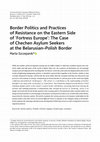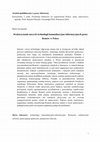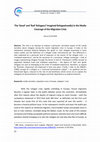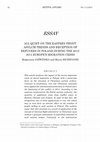Papers by Marta Szczepanik
La tasa de reconocimiento de solicitantes de asilo ucranianos en Polonia sigue estando en un nive... more La tasa de reconocimiento de solicitantes de asilo ucranianos en Polonia sigue estando en un nivel extremadamente bajo. El concepto de "alternativa de huida interna" es la base jurídica para rechazar muchas solicitudes de asilo.
Helsinki Foundation for Human Rights, 2021
This report focuses on the role of Ukrainian civil society organizations in
documenting the confl... more This report focuses on the role of Ukrainian civil society organizations in
documenting the conflict in Eastern Ukraine and provides an account of the NGO-documenters’ contribution to the pursuit of justice. Specifically, it investigates the connection between documentation and justice, looking at how documentation is produced and later used – either directly and indirectly – to achieve justice, understood as the restoration of rights of victims, as well as the prosecution of perpetrators of crimes.
Co-author: Quincy Cloet, Ph.D.
Summary of PhD thesis (unpublished)
Submitted in partial fulfillment of the requirements for the ... more Summary of PhD thesis (unpublished)
Submitted in partial fulfillment of the requirements for the award of PhD degree in social sciences at the Institute of Philosophy and Sociology of the Polish Academy of Sciences, Warsaw, Poland.
Helsinki Foundation for Human Rights. Country of Origin (COI) report.
Helsińska Fundacja Praw Człowieka
Raport COI (Country of Origin Information)

While the number of forced migrants moving out of conflict-ridden or otherwise troubled regions i... more While the number of forced migrants moving out of conflict-ridden or otherwise troubled regions into relatively stable and safe parts of the world is higher than ever, the countries of destination are increasingly trying to prevent migrants from reaching their territories. Given the scale of forced displacement and current trends of tightening immigration policies, it should be expected that tragedies at the borders, similar to that recently witnessed in Europe, will become the norm rather than the exception and that new discourses and practices will continue to emerge, transforming territorial borders in various parts of the world into highly conflictual and politicised 'borderspaces'. This article is a contribution to the understanding of borders through a case study of the recent policy of 'closed doors' that Poland has adopted towards Russia's North Caucasus asylum seekers at the country's eastern border with Belarus, preventing them from entering the territory and claiming protection. It demonstrates that, through the process of 'bordering', power is no longer exercised only by the border guards at the crossing point in Terespol from where asylum seekers are being returned and that it is increasingly to be found in social practices that occur on both sides of the border, away from the clearance points. The article examines the various practices of resistance undertaken by the asylum seekers and other actors on several different levels in response to the changed reality at the border. It also analyses the meanings and discourses developed by Polish state actors in order to legitimise restrictive migration policies.

While the number of forced migrants moving out of conflict-ridden or otherwise troubled regions i... more While the number of forced migrants moving out of conflict-ridden or otherwise troubled regions into relatively stable and safe parts of the world is higher than ever, the countries of destination are increasingly trying to prevent migrants from reaching their territories. Given the scale of forced displacement and current trends of tightening immigration policies, it should be expected that tragedies at the borders, similar to that recently witnessed in Europe, will become the norm rather than the exception and that new discourses and practices will continue to emerge, transforming territorial borders in various parts of the world into highly conflictual and politicised 'borderspaces'. This article is a contribution to the understanding of borders through a case study of the recent policy of 'closed doors' that Poland has adopted towards Russia's North Caucasus asylum seekers at the country's eastern border with Belarus, preventing them from entering the territory and claiming protection. It demonstrates that, through the process of 'bordering', power is no longer exercised only by the border guards at the crossing point in Terespol from where asylum seekers are being returned and that it is increasingly to be found in social practices that occur on both sides of the border, away from the clearance points. The article examines the various practices of resistance undertaken by the asylum seekers and other actors on several different levels in response to the changed reality at the border. It also analyses the meanings and discourses developed by Polish state actors in order to legitimise restrictive migration policies.
National report on Poland, in framework of the European Commission DG Justice project JUST/2014/R... more National report on Poland, in framework of the European Commission DG Justice project JUST/2014/RCIT/AG/CITI/7269, implemented by the Centre for European Constitutional Law – Themistokles and Dimitris Tsatsos Foundation in Athens and partners. Legal analysis: Maja Łysienia.

Internet i nowe technologie odgrywają ważną rolę w trwającym od kilku dekad procesie mobilizacji ... more Internet i nowe technologie odgrywają ważną rolę w trwającym od kilku dekad procesie mobilizacji etnicznej Romów, wspierając romską aktywność społeczną i polityczną oraz stając się narzędziem komunikacji pomiędzy Romami a społeczeństwem większościowym. Celem artykułu jest przedstawienie sposobu, w jaki członkowie społeczności romskiej w Polsce prowadzą w przestrzeni wirtualnej narrację na temat własnej grupy. Tekst przedstawia wnioski z badania auto-przedstawień Romów i organizacji romskich w Internecie, w ramach którego dokonano analizy stron internetowych, w tym stron organizacji oraz wydawnictw internetowych. Jednym z podstawowymi elementów, i zarazem celów romskich narracji, jest upowszechnianie romskiego dziedzictwa kulturowego, z charakterystycznym konfliktem pomiędzy chęcią ocalenia autentycznych tradycji, a promocją komercyjnego folkloru. Ponadto za pośrednictwem Internetu organizacje upamiętniają romską historię, poprzez m.in. gromadzenie świadectw romskiego Holocaustu. Strony internetowe organizacji romskich są również miejscem, w którym widać opisywane przez badaczy zjawisko symbolicznego powiązania między upamiętnianiem prześladowań a prowadzoną współcześnie działalnością w obronie Romów przed przejawami rasizmu i dyskryminacji. Popularność Internetu, obok zmiany pokoleniowej, która doprowadziła do powstania wykształconych elit romskich, przyczynia się do rozwoju zaangażowanych postaw wśród tej społeczności. Poprzez strony internetowe, organizacje romskie umożliwiają Romom aktywny udział w życiu społecznym i podejmowanie prób rozwiązania najbardziej palących problemów.

This text is an attempt to analyze a particular, normative aspect of the media narrative about re... more This text is an attempt to analyze a particular, normative aspect of the media narrative about refugees during the recent migration crisis in Europe. It looks at the substantive semantic distance between the 'good' or 'real' refugees presented in some media outlets and the definition of a refugee under international law. This difference is later explained by a particular kind of exposure to the events of the refugee crisis -a 'mediated experience', and by the existence of a normative 'refugee archetype'. I look at images representing refugees through the lenses of John B. concept of opposition between lived and mediated experience -the figures of 'bad' and 'good' refugees are seen as belonging to the order of mediated experience, therefore, as argued by Thomson, impersonal and dispersed in time and space. Finally, I refer to the concept of a refugee as a 'universal humanitarian subject' -an apolitical and dehistoricized figure, reduced to the role of aid beneficiary which serves me to explain the ambiguity of representations of refugees and their dependence on political interests.
Co-author: M. Górczyńska. Findings from a monitoring mission on access to asylum at the Polish ea... more Co-author: M. Górczyńska. Findings from a monitoring mission on access to asylum at the Polish eastern border conducted in early October 2016 at the Brest-Terespol border crossing point, published by the Helsinki Foundation for Human Rights (Warsaw, Poland) .
Country of Origin Information research/Opracowanie przygotowane w ramach projektu "Prawnicy Uchod... more Country of Origin Information research/Opracowanie przygotowane w ramach projektu "Prawnicy Uchodźcom 2" współfinansowanego ze środków Programu Krajowego Funduszu Azylu, Migracji i Integracji oraz budżetu państwa.

This article analyses the impact of the recent migration
crisis on forced migration to Poland, wi... more This article analyses the impact of the recent migration
crisis on forced migration to Poland, with a particular
focus on the situation of Ukrainian asylum seekers.
Contrary to predictions, very few Ukrainian nationals
have applied for international protection in Poland since
the beginning of the conflict in 2014. According to the
analyses conducted by the Polish asylum authority, the
majority of applicants come from conflict zones in
Eastern Ukraine and Crimea. In spite of this fact, the
recognition rate of their applications is very low which
may in turn have an adverse effect on the number of
people willing to seek asylum in Poland. The authors
argue that this situation is a result of application of the
concept of ’internal flight alternative’ to Ukrainian cases
without a genuine assessment of individual situation of
each asylum seeker. Contrarily to the information contained in recent international reports, Polish authorities take as a general rule that civilians fleeing Eastern Ukraine can, as internally displaced persons, relocate safely in other parts of the country. Other persisting human rights concerns and deficiencies of Polish reception system, in particular the amount of social aid offered to asylum seekers and lack of the
system of identification of vulnerable groups, may further deter Ukrainians from seeking asylum in Poland.
In: A. Alietti, M.Olivera and V. Riniolo (2015), "Virtual Citizenship? Roma communities, Inclusio... more In: A. Alietti, M.Olivera and V. Riniolo (2015), "Virtual Citizenship? Roma communities, Inclusion Policies, Participation and ICT Tools", McGraw Hill, Milan, Italy.






Uploads
Papers by Marta Szczepanik
documenting the conflict in Eastern Ukraine and provides an account of the NGO-documenters’ contribution to the pursuit of justice. Specifically, it investigates the connection between documentation and justice, looking at how documentation is produced and later used – either directly and indirectly – to achieve justice, understood as the restoration of rights of victims, as well as the prosecution of perpetrators of crimes.
Co-author: Quincy Cloet, Ph.D.
Submitted in partial fulfillment of the requirements for the award of PhD degree in social sciences at the Institute of Philosophy and Sociology of the Polish Academy of Sciences, Warsaw, Poland.
crisis on forced migration to Poland, with a particular
focus on the situation of Ukrainian asylum seekers.
Contrary to predictions, very few Ukrainian nationals
have applied for international protection in Poland since
the beginning of the conflict in 2014. According to the
analyses conducted by the Polish asylum authority, the
majority of applicants come from conflict zones in
Eastern Ukraine and Crimea. In spite of this fact, the
recognition rate of their applications is very low which
may in turn have an adverse effect on the number of
people willing to seek asylum in Poland. The authors
argue that this situation is a result of application of the
concept of ’internal flight alternative’ to Ukrainian cases
without a genuine assessment of individual situation of
each asylum seeker. Contrarily to the information contained in recent international reports, Polish authorities take as a general rule that civilians fleeing Eastern Ukraine can, as internally displaced persons, relocate safely in other parts of the country. Other persisting human rights concerns and deficiencies of Polish reception system, in particular the amount of social aid offered to asylum seekers and lack of the
system of identification of vulnerable groups, may further deter Ukrainians from seeking asylum in Poland.
documenting the conflict in Eastern Ukraine and provides an account of the NGO-documenters’ contribution to the pursuit of justice. Specifically, it investigates the connection between documentation and justice, looking at how documentation is produced and later used – either directly and indirectly – to achieve justice, understood as the restoration of rights of victims, as well as the prosecution of perpetrators of crimes.
Co-author: Quincy Cloet, Ph.D.
Submitted in partial fulfillment of the requirements for the award of PhD degree in social sciences at the Institute of Philosophy and Sociology of the Polish Academy of Sciences, Warsaw, Poland.
crisis on forced migration to Poland, with a particular
focus on the situation of Ukrainian asylum seekers.
Contrary to predictions, very few Ukrainian nationals
have applied for international protection in Poland since
the beginning of the conflict in 2014. According to the
analyses conducted by the Polish asylum authority, the
majority of applicants come from conflict zones in
Eastern Ukraine and Crimea. In spite of this fact, the
recognition rate of their applications is very low which
may in turn have an adverse effect on the number of
people willing to seek asylum in Poland. The authors
argue that this situation is a result of application of the
concept of ’internal flight alternative’ to Ukrainian cases
without a genuine assessment of individual situation of
each asylum seeker. Contrarily to the information contained in recent international reports, Polish authorities take as a general rule that civilians fleeing Eastern Ukraine can, as internally displaced persons, relocate safely in other parts of the country. Other persisting human rights concerns and deficiencies of Polish reception system, in particular the amount of social aid offered to asylum seekers and lack of the
system of identification of vulnerable groups, may further deter Ukrainians from seeking asylum in Poland.
This papers draws on the research conducted in 2014 among the beneficiaries of the regularisation programme of 2012 in Poland. The eligibility conditions for regularisation set forth in the programme included, among others, irregular stay on the day of entry of the law into force and uninterrupted stay in Poland since at least 2007. Over 4500 persons obtained a stay permit as a result of the procedure. Semi-structured in-depth interviews were collected from 45 migrants, majority of them citizens of Ukraine, Vietnam and post-Soviet countries; 70% of interviewees were migrant workers. The material collected is not only a document of migrants’ precarious existence in the legal and social ‘grey zones’ but also of their migration patterns, adaptation strategies and attitudes towards the Polish society. It also points to the broader problem of an invisible but necessary workforce, especially in the sector of domestic services and the care of the elderly characterised by a steady rise in demand.